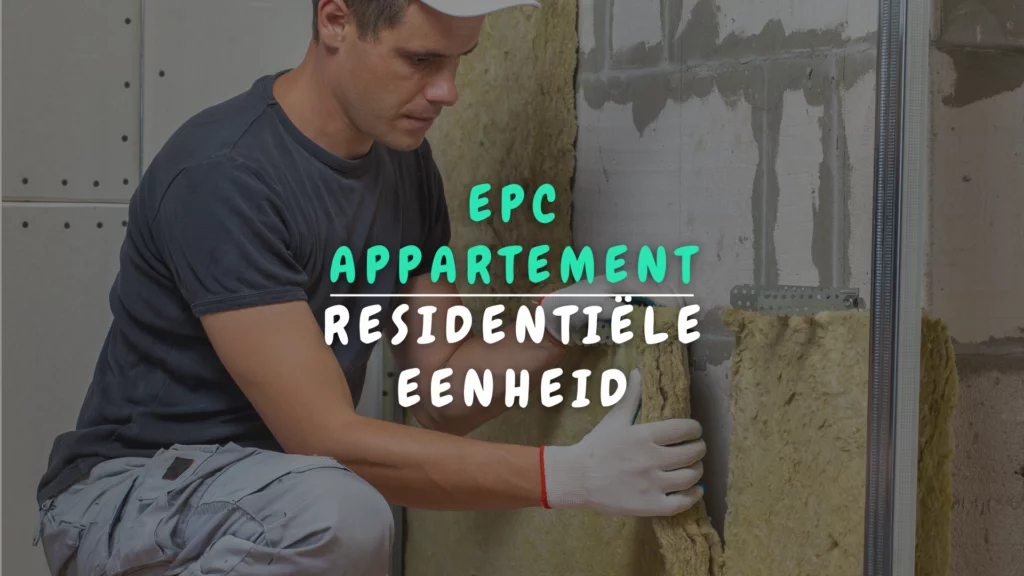Do you own an apartment? If so, you are recently required to submit the EPC Residential Unit. For houses, this is mandatory when selling or renting. What does it say? Find out in this article!
What is the EPC Residential Unit?
EPC stands for Energy Performance Certificate. The EPC is a document that shows how energy efficient your home is. You will find information about the building envelope, space heating, ventilation, lighting, solar energy and hot water heating.
For houses
All houses must have an EPC Residential Unit when sold or rented out.
For apartments, studios, cottages, etc.
All apartment buildings with more than 2 apartments in Flanders must have an EPC label of the common parts and of the residential unit.
The common parts document is called“EPC Common Parts” (EPC GD) and the unit document is called“EPC Residential Unit.”
This will give potential buyers or tenants an idea of the energy efficiency of the entire building. As a landlord, you are obliged to present this document, even if you do not sell or rent your apartment.
What is a residential unit?
A residential unit:
- functions autonomously with a living area, private toilet, private bath or shower and private kitchen or kitchenette.
- Has its own lockable access from a public road, yard or shared circulation area.
- Is fully or partially suitable for residential, commercial or recreational use.
Examples:
- A cohousing unit with private toilet and private kitchenette.
- A studio without its own entrance and the underlying store with which it shares the entrance are one unit.
- A dorm with multiple student rooms and one common kitchen is one unit.
- A single-family home is one unit.
What does the EPC Residential Unit say?
The EPC Residential Unit is prepared per house, apartment, studio or collective residential building. The EPC includes:
- The current energetic state, depicted with color bars for each category:
- Roofs
- Walls
- Flooring
- Windows (glazing and profile)
- Heating
- Lighting
- Solar
- The overview of recommendations to improve energy performance
- An overview of concerns and websites with guidance on how to tackle a renovation
What are the conditions?
These are the terms of the EPC Residential Unit:
- You create the EPC on a unit-by-unit basis.
- A licensed energy expert (Type A) must prepare the EPC.
- It is mandatory when selling and renting the unit.
- You are required to include the EPC in advertisements along with the EPC Common parts.
How much does the EPC cost?
There is no set cost for the EPC. The price depends on:
- unit size.
- the energy expert (type A).
- unit complexity.
- the travel costs of the energy expert.
How long is the EPC valid?
The EPC Residential Unit is valid for 10 years. However, the certificate must remain current. If you take measures to improve energy performance (e.g.. insulate), then you should have the EPC revised.
What are the benefits of the EPC Residential Unit?
For renters/buyers:
- It provides an insight into your energy consumption and home comfort.
- It gives you necessary information to compare with other potential rental apartments and houses.
For landlords/sellers:
- Having a positive EPC makes it easier to rent out your apartments.
- It gives an overview of what to tackle first and how best to do it – as an owner.
- It makes it easier for the co-owners’ association (VME) to decide what renovations are needed.
- Can you demonstrate that you improved the EPC? Then you may be eligible for grants and subsidies.

EPC Residential unit application in 6 steps
Step 1: Syndicator informs owner or VME
For apartments, the building manager (syndic) notifies the owner or association of co-owners (VME) to provide the EPC.
Step 2: Collect supporting documents.
The trustee and owner or VME collect all evidence about the energy performance of the common parts such as insulation, joinery, glazing. Note for apartments: No EPC Residential units may be prepared without an EPC GD.
Step 3: Make an appointment with an energy expert
The owner or trustee makes an appointment with an energy expert (Type A).
Step 4: Energy expert site visit
During the site visit:
- the owner or trustee and occupant shall ensure that the unit is accessible to the energy expert.
- the owner or trustee ensures that the energy expert receives the supporting documents.
- the energy expert examines the unit.
Step 5: Receive the EPC Residential Unit
The energy expert sends the EPC to the owner or VME.
Step 6: Share the EPC
The recipient shares the EPC with:
- the owner or VME and syndicator, and together go over the recommendations.
- the residents.
- the prospective buyers and/or prospective tenants.
Note for apartments: When selling, you transfer the EPC GD along with the EPC Residential Unit to the new owner(s).

The EPC Residential Unit is your guide to a more energy-efficient future! An energy efficient building is not only good for the environment, but also for your wallet and the comfort of all residents.
Article tips:
- What EPC do you need?
- EPC Non-residential unit (EPC NR).
- EPC Construction
- EPC Common Parts (EPC GD).
Would you like to cite this article as a source? Then use:
Stiasteny, L. (2024, May 16). EPC Residential unit. Apartment.com. Accessed on (date XX/XX/202X), from https://www.appartement.be/epc-residentiele-eenheid






